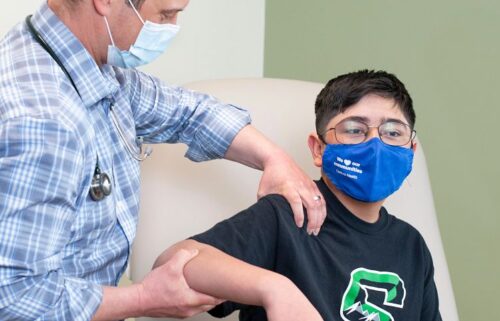COVID and the brain: Colorado Springs doctors discuss what they’ve seen in patients
COLORADO SPRINGS, Colo. (KRDO) - Two years into the pandemic, we’re getting a better idea at how COVID-19 affects our bodies.
While coronavirus started as something people worried about impacting their lungs, we now know the virus doesn’t just stop there. Doctors say even your brain can be affected in detrimental ways.
Doctors from Colorado Springs Neurological Associates tell KRDO that COVID has not only brought new patients into their practice who are struggling with problems, but it also has exacerbated issues that previous patients were already enduring.
KRDO's Mallory Anderson sat down with Neurologist Dr. Julia Brinley and Clinical Neuropsychologist Dr. Brittni Morgan from Colorado Springs Neurological Associates to discuss their observations over the last two years.
Have you seen patients come in with brain changes or issues associated with COVID?
Dr. Julia Brinley, Neurologist: Yeah, absolutely. It's actually been pretty common for patients to come in after they've had COVID and now have symptoms related to such, whether I had been seeing them before and now their symptoms are worse, or for brand new symptoms and issues.
Dr. Brittni Morgan, Clinical Neuropsychologist: I have, and I think, really to a greater extent, I've seen a lot of people coming in who maybe noticed things before COVID, but then really felt like they were exacerbated either due to having COVID or due to the stressors associated with the pandemic.
Have you had patients talk about brain fog after having COVID? How common of an occurrence is that?
Dr. Brinley: That is actually pretty common with what we're seeing across the board, especially with symptomatic patients.
Dr. Morgan: Yeah, I think brain fog is a really common complaint. Brain fog is really one of the top three symptoms that people who are experiencing these kind of long-term cognitive side effects are experiencing. It's kind of hard to understand because it's really a constellation of things generally referring to difficulties with attention, short-term memory, and then really thinking that mental acuity seems off. But there are direct things related to COVID that can lead to brain fog, like a stroke or hypoxia, which is having lower oxygen levels. But there's also a number of other factors that we know contribute to brain fog, like mental health symptoms being a big one, or stress.
People may have only started hearing about brain fog because of COVID and how many people are experiencing it now. Is this something that has existed before COVID?
Dr. Morgan: Absolutely. So I think brain fog is really common in patients with fibromyalgia. It's also common in patients who have undergone chemotherapy, and MS patients. So it's certainly a fairly common cognitive complaint once there's been some sort of neurologic or contributing factor.
For those who haven't endured brain fog, can you tell us what your patients say it feels like?
Dr. Morgan: It's feeling like things are slower, and feeling like it's harder to attend to things in the moment. Then when there's difficulty attending to things in the moment, it's harder to recall the details of those things as far as short term memory goes.
What has concerned you the most about COVID and the brain?
Dr. Brinley: What I see that's really concerning in my clinic right now, are these really, really young patients with vascular events. I've actually seen a few patients with strokes or venous thrombosis coming in after they've had COVID, that is likely attributed to that. Then they're also having these other chronic long-term issues along with the brain fog. It's really hard to counsel people right now with, 'what's the long term looking like?' because we just don't have the data right now to really say, 'this is what we're going to expect in a few weeks, a few months or even a few years.' So that's kind of the challenging part of it.
Dr. Morgan: For me, the most concerning thing has been patients that had very mild COVID symptoms or those that were asymptomatic, but are still experiencing these post-acute COVID type-symptoms. Like the fatigue, cognitive symptoms, malaise, all of those kind of symptoms we would expect to see in someone who had a more severe course. But these are patients that may not have had symptoms immediately following COVID.
A new study from the UK shows the brains of those who had COVID had a greater loss of gray matter and abnormalities in the brain tissue. Is that worrisome?
Dr. Brinley: That was actually a really interesting article that I was able to read through. In my opinion, it shows, yes, whether it's primary or secondary, there are changes and affect on the brain from COVID, whether it's long term or significant at this point, it's really hard to say. But for me, it says we still should take precautions and try protecting ourselves, whether that's not going out if you're sick, or vaccines, or masks, or whatever you need to do to at least try to reduce your risk of getting COVID still, because there is just so much we don't know, and we are seeing studies that may have some effects long term.
Dr. Morgan: I think that any study that suggests there's a loss of gray matter is worrisome. I still think there's limitations to what conclusions we can draw from studies like this. Some of the biggest ones are, we don't know for sure if these are chronic changes or if these are more transient things that we might expect to see recovery in over time. Also, we don't have enough information to talk about how these changes relate to people's actual symptoms, especially some of these long hauler COVID patients, or related to other factors. The other thing is, there were some limitations regarding how in-depth the cognitive testing that they completed was. So I think we really need some more in-depth longitudinal studies using gold standard cognitive measures in order to be able to draw some more sweeping conclusions like that.
What are some brain issues people are coming to you with that may surprise viewers?
Dr. Brinley: I think the biggest thing would be these young patients that are coming in with strokes. That's been kind of the scariest part, seeing these patients come in that are usually very healthy, with new onset headaches and weakness, numbness, just a wide variety of things. It's not only, you know, old people with co-morbidities. We are seeing some of these younger patients come in with neurologic issues, too.
Dr. Morgan: For me, one of the more surprising things has been these patients who are experiencing cognitive symptoms, and those are correlated with findings that we're seeing on testing, that never had COVID. So things like executive functioning being weaker or processing speed. And it really seems like those are in part due to the stress associated with the pandemic, the social isolation, and some of these lifestyle changes. So sleep being out of whack, alcohol consumption, mental health symptoms being exacerbated. I think sometimes we tend to underestimate the role that those things can have, and can produce very real cognitive impairments similar to what we see in neurologic injury or illness.
Are there things people should keep an eye on when it comes to their brains and memory if they’ve had COVID?
Dr. Brinley: For me, it's just paying attention to your symptoms, knowing that when you have COVID, you're not going to feel good, and once you've gotten over that, just paying close attention to how things have changed. Are things persisting if you're not getting better? You would want to have a discussion with your primary care physician about if further testing needs to be done, or ruling out other things that could also be going on.
Dr. Morgan: I think people should keep an eye on things and monitor their symptoms. And if friends or family are noticing things in loved ones, or if they are noticing things in themselves, to kind of think about what might be contributing, or what seems different. Are they not sleeping well? Are they consuming more alcohol, or are they feeling depressed or feeling anxious? And then talk to their doctors about those things. Oftentimes your doctor will want to do a cognitive screening to see if more in-depth testing, such as what I do with a neuropsychological assessment, would be beneficial to help kind of identify more if there are changes that we would expect to see on testing.




